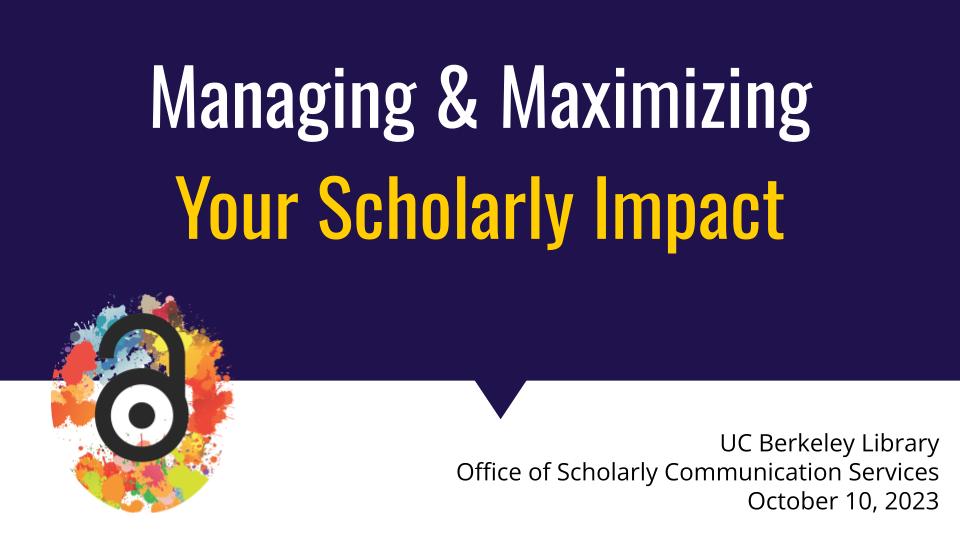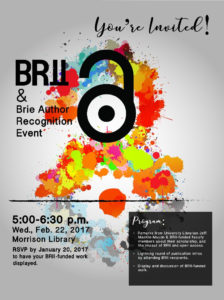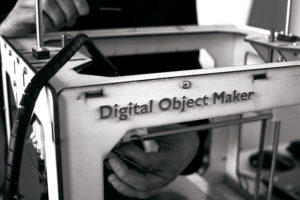Tag: scholarship
Workshop Reminder — Managing & Maximizing Your Scholarly Impact on October 10, 2023

Date/Time: Tuesday, October 10, 2023, 11:00am–12:30pm
Location: Hybrid: Join in person at 223 Doe Library, or on Zoom. Register via LibCal.
This workshop will provide you with practical strategies and tips for promoting your scholarship, increasing your citations, and monitoring your success. You’ll also learn how to understand metrics, use scholarly networking tools, evaluate journals and publishing options, and take advantage of funding opportunities for Open Access scholarship.
Join us next week!
Library Statement on Commitment to Free and Open Information, Scholarship, and Knowledge Exchange

Global Knowledge Exchange
This post originally appeared on the University of California Office of Scholarly Communication‘s blog, March 6, 2017.
The University of California Office of Scholarly Communication (OSC) and the University of California Libraries issue the following statement in response to recent actions by the new federal administration and in order to address resulting concerns about continued open access to and preservation of information, scholarship, and knowledge.
The unfettered exchange and careful preservation of information are fundamental to democracy, progress, and intellectual freedom. The critical research and scholarship conducted by government entities and academic institutions worldwide safeguard and support human rights, public health, the environment, artistic and literary enterprise, scientific and technological innovation, and much more. This scholarship is critical for informed discourse and policy development throughout society. As such, the fruits of governmental and scholarly research—the data and documentation generated and released—must remain publicly available and must not be suppressed, endangered, or altered to serve political ends.
To encourage broad dissemination of research and scholarship, the faculty of the University of California and the UC President have implemented open access policies that echo many of the open data and scholarship mandates adopted by the federal government. Recognizing that open access to research increases scientific, scholarly, and critical knowledge, the UC system has committed, via these policies, to making all UC scholarly articles widely and freely accessible, regardless of access restrictions elsewhere. Now more than ever, UC faculty and staff’s participation in these open access policies is fundamental to ensuring persistent, unfettered access to valuable data and research.
OSC and the UC Libraries are working to protect public access to government data and research in the event that the original sources for these materials should be compromised. In the coming weeks, OSC and librarians on each of the UC campuses will identify specific actions to be taken to ensure that research data, publications, and scholarship remain accessible and discoverable. These efforts are not intended to supplant the authoritative sources for government data, publications, and information. Rather, we are working to make certain that these materials remain shielded from inappropriate political influence or suppression.
We support similar information rescue and preservation efforts taking place around the country and encourage other institutions to join in this commitment. We look forward to seeing statements from our peer institutions (and encourage any who wish to borrow or adapt ours), and we welcome opportunities to work with these institutions on projects supporting access to and preservation of the scholarly record. In particular, we offer our collaboration to those working in disciplines or within organizations facing new threats.
In the meantime, we wish to underscore our commitment to advocating not only for researchers and authors at UC campuses, but also for scholars and readers worldwide, and to emphasize our dedication to ensuring information access as an essential public good. We will continue to champion these professional and democratic values and to challenge any policies or practices that levy obstacles to intellectual exchange.
UC Berkeley Open Access Authors: We’re Celebrating You!

Join faculty, students, and colleagues for wine and cheese as the UC Berkeley community recognizes and discusses UCB open access papers at the BRII & Brie Author Recognition Event (open to all) being held in Morrison Library on Feb. 22, 2017 from 5:00-6:30 p.m.
We’re Celebrating Because You’ve Published For Impact
You’re over the moon because your new paper has just been accepted to a high-impact journal that is published open access—free, digital, and available to anyone online. You chose this journal because open access (OA) publishing can promote increased readership by lowering access barriers, and can spur innovation through fewer restrictions on use.
But suddenly you’re faced with a quandary: There’s a steep fee to make all this happen—an “article processing charge” (APC), typically somewhere between $650-$3,500, that authors are asked to provide to publishers for OA publication in lieu of typical print-subscription fees paid for by libraries. You want people to read and cite your scholarship, and you hope to advance knowledge by enabling maximal use of your scholarly output. But how can you finance and participate in this new scholarly publishing landscape?
One option is to deposit a copy of the article you submitted into a repository, in keeping with the UC system’s OA policy. (For more on the OA policy, see the UCOP Office of Scholarly Communication’s helpful guide.) To that end, UC scholars and staff can deposit pre-print copies of their publications in eScholarship (the repository created by California Digital Library), or can choose a discipline-specific repository like arXiv or the new Humanities Commons.
Depositing preprints and making them available at no cost to the public in this fashion can have remarkable impacts for building knowledge and augmenting your academic reputation. Yet, there is still one other parameter of an APC-based OA publishing system that remains to be addressed: covering the APC, itself. What can you do when an esteemed open access journal like BMC Biology asks you to provide $2,785 to publish your accepted paper in their online journal? Maybe you have grant funds to cover this APC, but maybe you don’t, and maybe you don’t have a grant at all.
What’s The Solution?
UC Berkeley’s Library can help, and we’re about to start celebrating that. The Berkeley Research Impact Initiative (BRII) makes APC funding available to UC Berkeley authors (current faculty members, post-docs, students, researchers) and publishers (campus Centers, Organized Research Units, and Departments) to make your publications free to all readers immediately upon publication—thereby also helping to increase the impact of your scholarship.
Started in 2008, BRII has provided around $400,000 of funding for several hundred articles and publications across numerous discipline areas. In a 2016 paper, authors Teplitzky and Phillips reported that 89% of responding BRII recipients agreed that the availability of BRII to help pay the APC or open access fee for their article affected their decision about where to publish, and 44% had not published an open access article prior to the one funded by BRII. Most respondents (82%) believed their article had a greater impact overall because it was OA.
Let’s Celebrate UC Berkeley Scholarship!
So, it’s high time to recognize the scholarship of BRII-funded authors, and raise awareness about available BRII funding. That’s exactly what the Library will be doing with the BRII & Brie Author Recognition Event (open to all) being held in Morrison Library on Feb. 22, 2017 from 5:00-6:30 p.m.
You can hear remarks from University Librarian Jeff MacKie-Mason and BRII-funded faculty members about their scholarship, and the impact of BRII and open access. There will also be a lightning round of paper discussions by attending BRII recipients, so you can learn more about the OA scholarship being created here at UC Berkeley. BRII-funded works will also be displayed, so if you already are a BRII recipient, please RSVP by January 20 to have your work shown at the event.
We hope you’ll join us to celebrate your colleagues in an evening of learning and author recognition. If you know little about OA or BRII, but aspire to publish, please join us to find out more about this important funding program. RSVP here!
Digital Humanities for Tomorrow
Opening the Conversation About DH Project Preservation
By Rachael G. Samberg & Stacy Reardon

Digital Object Maker. Sayf, CC BY-NC-ND 2.0
After intensive research, hard work, and maybe even fundraising, you launch your digital humanities (DH) project into the world. Researchers anywhere have instant access to your web app, digital archive, data set, or project website. But what will happen to your scholarly output in five years? In twenty-five? What happens if you change institutions, or institutional priorities shift? Will your digital project be updated or forced to close up shop? Who should ensure that your project remains available to researchers? Which departments should guide long-term sustainability of your research? Continue reading “Digital Humanities for Tomorrow”